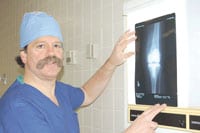These Four Steps Will Improve Our Health Care System
The respected National Academy of Sciences declared last November that “the health care delivery system is incapable of meeting the present, let alone the future, needs of the American public.” Although we now spend $1.5 trillion a year on health care, 42 million remain uninsured, and access to care is increasingly difficult for everyone.
In Massachusetts, patients pay more than ever, providers get less than ever, and the health care system is shrinking. Many hospitals have closed or are at risk of closing, and shortages of nurses and physicians are making some types of care unavailable in certain areas. Emergency rooms are full, and cutbacks in the state budget will make matters worse by eliminating routine care for thousands of people. We are destroying our capacity to deliver routine care, let alone manage a major epidemic or act of bioterrorism.
Our health care system is crumbling under the weight of its own inefficiencies. The time has come for insurers, providers, and government leaders to reform our health care system. To accomplish this, we must do four things:
Reduce administrative overhead, which currently consumes almost 40{06cf2b9696b159f874511d23dbc893eb1ac83014175ed30550cfff22781411e5} of every health care dollar. We’ve created a nightmarish system of medical billing and accounting that is the most inefficient in the world. Much of this unproductive paperwork is imposed upon providers, who must employ an army of skilled administrative staff just to get paid. This diverts billions of dollars away from clinical care. Anyone who pays for health care pays for these costs. Other American industries have used automation and simplification to reduce administrative overhead. It’s time for our health care system to do the same and redirect the enormous savings into taking care of patients.
Improve the effectiveness of health care. Most health care is organized in management systems that have been unchanged for a half-century. The first necessity is an integrated electronic information system embracing the full complexity of modern medical treatment and capable of providing that information to clinicians anytime, anywhere. We need management systems that routinely coordinate care and, at the same time, measure the quality, effectiveness, and outcome of that care.
If providers use modern management techniques to deliver better care at a lower cost, they must be able to participate in the savings. And we need a new system of incentives for front-line clinicians, so they will at last be appropriately rewarded for quality, productivity, innovation, and prevention.
Develop ways to control the use of expensive new technology. Our unrestrained use of new drugs, devices, and diagnostic tests is the fastest-rising part of the health care budget, and it’s breaking the bank. Many new technologies offer great benefit, but others are no better than older products that cost a fraction as much.
The adoption of new technologies is driven by consumer demand and marketing. We have no system for selecting and deploying new innovations based on the best scientific evidence regarding their cost-effectiveness in relation to existing technologies. We must develop an ongoing, orderly process that scrutinizes the scientific data regarding the pros and cons of each new innovation and that leads to rational choices regarding the way it should be integrated into our health care system.
Agree about how much health care people should get. Should every person with a headache get an MRI of the brain? Should every person with a stomach ache get a CT scan of the abdomen? Is it malpractice if a physician chooses not to do all of these expensive things? If we do not set limits and stick to them, the health care budget will be a crushing burden on our economy. This is in one sense a political process, but our decisions about who gets what kind of care must be based on scientific evidence.
Massachusetts is perfectly placed to lead the nation in reform. No other state has such a wealth of talent in both the scientific basis of health care and the new wave of health care management techniques. No other state economy is so broadly grounded in health care innovation. Massachusetts has able government and business leadership and a proud history of public-private partnerships. Now is the time for leaders in health care, government, and business to begin creating a health care system that is better, cheaper, safer, and easier for every citizen of the Commonwealth.
Dr. Charles A. Welch is past president of the Massachusetts Medical Society and a psychiatrist at Massachusetts General Hospital.



Comments are closed.